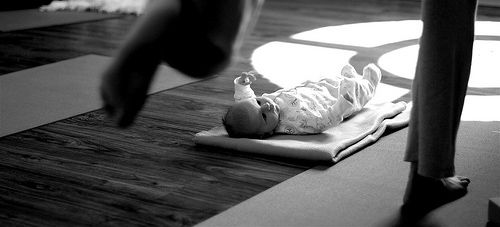When I found out I was pregnant, which was anything but expected, my first thought was: “I am utterly unprepared and unequipped to be a mother!” It was only after my son was born that I realized how being a yoga teacher had actually prepared me quite well for what was to come. Actually, it's not about being a yoga teacher at all. Any kind of vocation that requires you to take care of others, be nurturing and sometimes put others' needs before your own, bears striking similiarities to what motherhood is.
How many times have I taught while I was sick, or sad, or tired or stressed out? How many times have I had to leave all that outside the door, walk into the room and be present for others? It didn't feel too foreign then to take care of a newborn after a night (or several nights) of interrupted sleep. In the early days of motherhood, I would not even find time to eat, and yet wasn't get cranky or impatient at all (a virtual impossibility before motherhood). I was surprised with what lightness I took on this responsibility that had initially scared the living daylights out of me.
I like to call this the magic of Karma Yoga. When we make serving others our aim, then automatically the me, myself and I retreats into to the background. And for some reason, we are able to perform, even though we thought we didn't have it in us. Like my teacher often used to say to us, shifting the focus from “what can I get out of this?” to “what can I give to this?”, can work magic.
However, there's a pitfall to this, too. There's the other side of the medal. The buddhists say that self-deprecating strengthens the ego just as much as self-inflating. In other words, making things always about others and making yourself small is neither healthy nor wise. If we tend to make others the priority, we also tend to tune out our inner voice. And at some point, we need to feed ourselves as well, lest we starve ourselves, literally and metaphorically.
It is a fine balance. I have been working with young mothers for a while now. I like to observe the moms in my regular postnatal yoga class: Mothers are allowed to bring their babies, but don't have to. Some do, because it's easier and requires less planning in terms of feeding and babysitting. Some don't, because they really want to have that chunk of time and practice to themselves. I think both motivations are valid and great.
What I often say to them is this: In a way this class is a direct mirror of reality. It doesn't matter whether you have your baby lying on a blanket in front of you or not. Learning to have healthy boundaries becomes more important once we have experienced the ultimate symbiosis of carrying a child, which corresponds to no boundary at all between you and this tiny human.
There's always more we can do for others, especially for our children. We are always needed. But we can only serve, if we make sure we keep our strength, if we don't dilute our substance. I know moms who have burnt out, because they felt under such pressure to be there for everyone, to keep all the balls up in the air.
The trouble I find with this is, that there's no set recipe, no strategy that always applies. You cannot say: “Ok, now I know, so I'll always do that. Or I'll always handle situations like so.” The only key is constant vigilance. Every moment, every situation is different and calls for different action or reaction or sometimes no reaction at all. Maybe the key is to create space for observation and contemplation, for questions and honest answers: What is it that I need now? How can I serve others today and am I in the condition to do so? If we can create space in our mind and keep the heart open, the answer will emerge – from a place that is not rational or self-centered, but intuitive and attuned.


No comments.